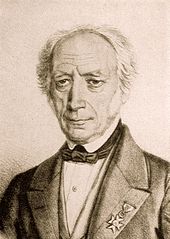Pietro Raimondi
Pietro Raimondi (born December 20, 1786 in Rome ; † October 30, 1853 there ) was an Italian composer and music teacher .
Live and act
Raimondi, a child from a poor background, was handed over to a wealthy aunt by his widowed mother, who sent him to the Conservatory in Naples , where he was an enthusiastic counterpoint student of Giacomo Tritto . After six years his aunt withdrew her support, and Raimondi returned to his mother in Genoa , where he wrote some operas. In 1811 he returned to Naples, where almost all of the 40 or so operas he wrote over the next 30 years saw their first and often only performance. In 1824 he was appointed music director of the Royal Theater in Naples ( Teatro San Carlo ). A year later, after Tritto's death, he and Francesco Ruggi succeeded him as counterpoint teacher at the Naples Conservatory. In 1833 he became a lecturer in counterpoint and director of the Palermo Conservatory . In 1834 Giovanni Pacini called him "the most famous counterpoint artist of our time". Nevertheless, he was not happy in Sicily and unsuccessfully applied for jobs in major music centers (Paris, Milan, Dresden). His operas were still written in the style of the Neapolitan school and were therefore considered old-fashioned, as developments had taken different paths since Rossini .
Raimondi has specialized as a fugue composer since the 1820s. He wrote up to six fugues that could be performed both independently and simultaneously. In 1836 a mass was performed in Palermo, which consisted of two eight-part masses, which could also be performed independently of one another and simultaneously. Another step were the three oratorios Putifar, Giuseppe and Giacobbe , which he composed in 1847-48. On August 7, 1852, they were performed at the Teatro Argentina in Rome with 430 participants in a concert that lasted six hours. The successive performance of the individual oratorios was under the direction of various conductors, Raimondi took over the final simultaneous performance of all three oratorios. He was so overwhelmed by the sound that he passed out at the end of the performance. As a celebrity he was received by the Pope, received a gold medal and in December 1852 a position as choirmaster of the Cappella Giulia at St. Peter's Basilica , which he was only able to practice for a few months before he became terminally ill. The orchestration of his Opera seria Adelasia and his Opera buffa I quattro rustici remained unfinished. It was intended to perform these two works simultaneously on a shared stage. The orchestration was completed by his favorite student Pietro Platania , but never performed.
Web links
- Sheet music and audio files by Pietro Raimondi in the International Music Score Library Project
- List of the stage works by Pietro Raimondi based on the MGG at Operone
| personal data | |
|---|---|
| SURNAME | Raimondi, Pietro |
| BRIEF DESCRIPTION | Italian composer and music teacher |
| DATE OF BIRTH | December 20, 1786 |
| PLACE OF BIRTH | Rome |
| DATE OF DEATH | October 30, 1853 |
| Place of death | Rome |
